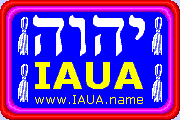
IAUA End Time Ministry
Preparing for the End of Time
The Lord is Coming! Are you ready?

|
IAUA End Time Ministry |
|
Preparing for the End of Time | |
|
The Lord is Coming! Are you ready? | |
| Home / Archives | |
|
Dear Brothers and Sisters in
IAUA
(ee-ah-oo-ah) our Father,
Greetings on this day of preparation for the weekly Sabbath. I hope this newsletter finds you in good health and happy in the service of the Lord. This is the 9th day of the second month. It is three weeks and four days until the evening of Pentecost Sabbath (Wednesday May 23). A newsletter reader has commented that they find my use of the terms first month, second month, and so on as out of step with the usual convention of using the Jewish names for the months. I discussed with them the significance of the fact that the Bible usually uses the same terms I do. It is interesting to note that the typical "Jewish" names of the month are more accurately Babylonian or Chaldee names and not "Jewish" at all. I am certainly not interested in using Babylonian names nor am I particularly interested in using the few names that are "Jewish" or Hebrew. I do not usually use the "Jewish" names for the yearly Sabbaths either. I may refer to these names for cross-reference purposes. I have absolutely nothing against anything Jewish as long as it does not contradict the Bible or distract from Biblical principles. Much of what is sometimes called Jewish is actually Biblical principle and tradition. I adhere so closely to Biblical principle, such as wearing the tassels, that people often make the mistaken assumption that I am either Jewish or highly interested in Judaism and Israel. When people talk to me about Israel in a way that shows they think it is a topic of great interest to me, I just smile and nod my head. I am neither particularly interested nor disinterested but people often assume it is of great interest to me. People often talk to me at great length about things which are actually Jewish tradition and think I should be interested in these things. Please do not get the impression that I think it is wrong or I am against using Jewish words. I usually don't but that is just a habit not a judgment. Names are another matter entirely. I will always use the Hebrew name of God and the Messiah unless I may confuse or offend someone. There are two Hebrew words that are so well known to English speaking people that I often use them. Shabbat Shalom! This reminds me of one of my pet peeves. I hope you don't mind if I share it with you. People rarely refer to the prophet Daniel by his Babylonian name of Belteshazzar but they almost always refer to his companions Hananiah, Mishael, and Azariah by their Babylonian names of Shadrach, Meshach, and Abednego. I think it is far more appropriate to use the Hebrew names they were born with rather than the names assigned to them by their Babylonian captors. Does my pet peeve seem silly to you? This is of particular interest to me because all four names refer to God. Two of the names use the very common Old Testament Hebrew practice of ending with part of the name of God, IA or IAU. It is amazing to do a word study of Hebrew names and discover how many of them begin or end with the name of God. It is also interesting the large number of different English spellings given to the same Hebrew letters. Names ending in ia, ijah, jah. iah, and others are all the same two or three Hebrew letters. It is interesting to note that even the word Jew is actually nothing more than the name of God, IAU. The substitute of the sound and letter of "J" for "IA" is a routine part of the Jewish practice of hiding the true name of God from Gentiles. In modern times the tradition has gone so far that Jews won't even write the word G-d. While I do not find it valuable to impress people with the use of Hebrew words, I do find the study of Hebrew words very valuable. It is interesting to note the many different ways that the same Hebrew word is translated. My personal favorite is the word mo'ed, appointed time. It is enlightening to look up the various ways this word is used in the Bible and how it is translated. I encourage you to dig deeper in your Bible study. There is so much to see and learn. The website: www.BlueLetterBible.org is a tremendous resource to allow any English student to learn a lot about Hebrew and Greek in the Bible. Another extremely valuable off-line resource is the free and downloadable e-Sword: www.e-Sword.net Do you find daily blessings from the study of the Word of God? I pray that we may all continue to strive for peace and unity in truth preparing for the soon coming of IAUShUO (ee-uh-oo-shoo-oh) Messiah, the Son of God. Shabbat Shalom,
Frank T. Clark
Next: 2007-05-04 Rightly Dividing the Word |
|
Revised 2007-05-04 |